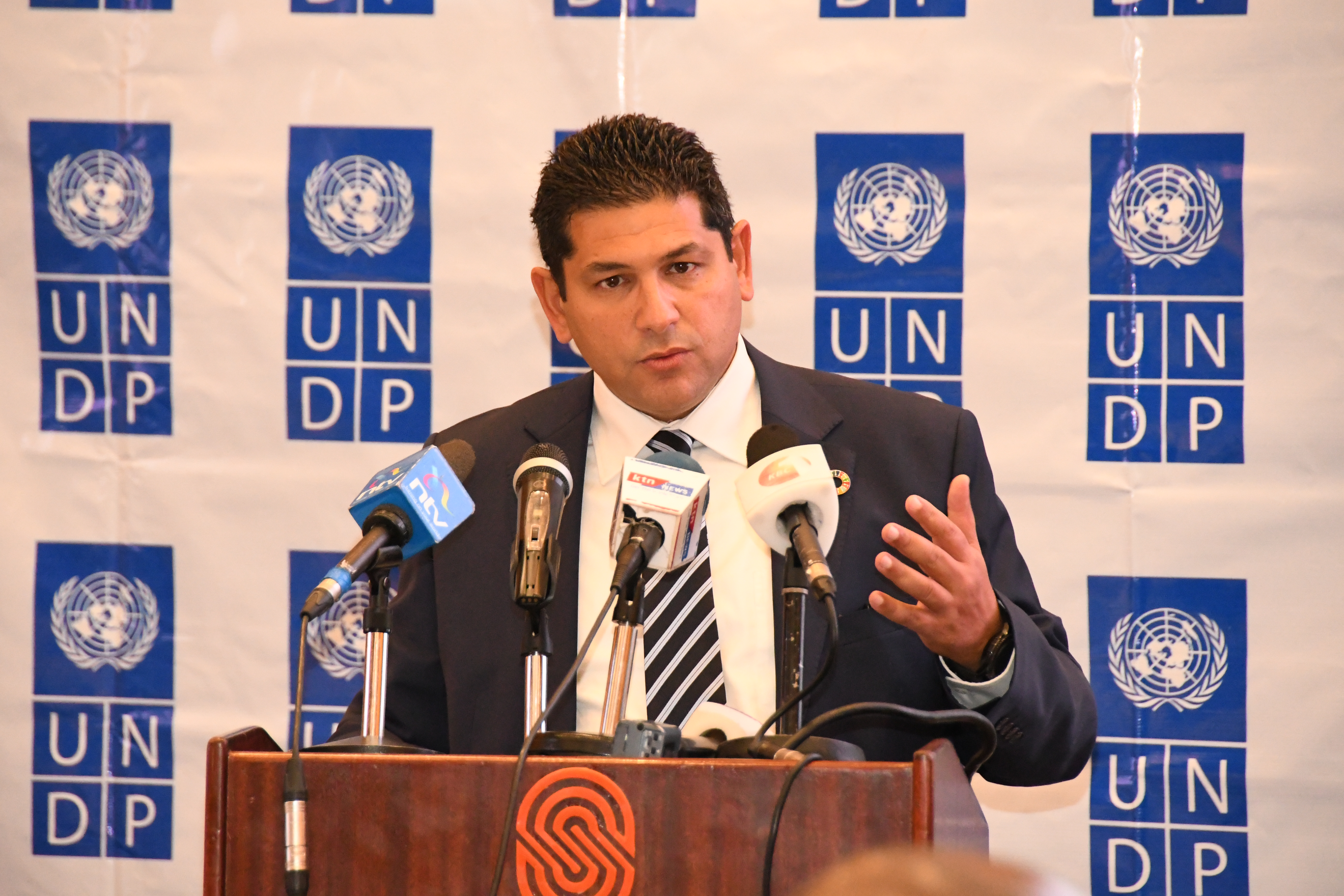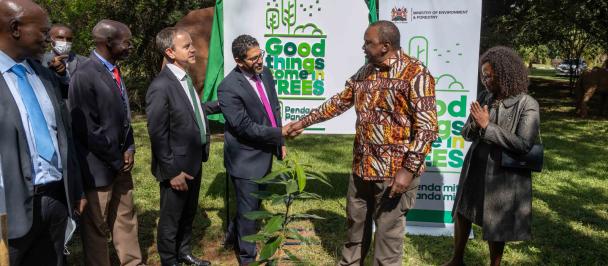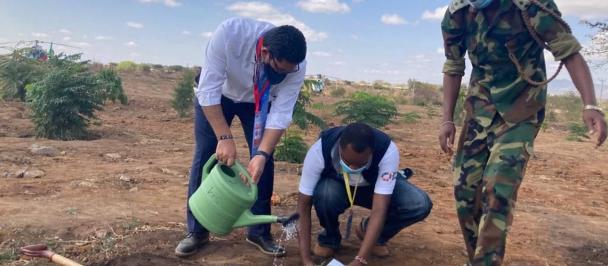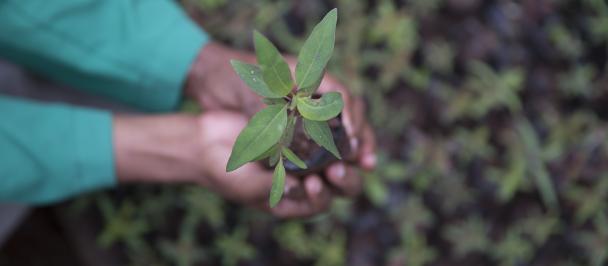UNDP Resident Representative in Kenya, Walid Badawi delivers his statement at the media breakfast meeting on the national 10% forest cover (Photo, KFS)
[salutations]
Let me start by quoting the Late Noble Laureate and champion of the Environment, Professor Wangari Maathai “You cannot protect the environment unless you empower people, you inform them, and you help them understand that these resources are their own, that they must protect them.”
It therefore gives me great pleasure to be here today as we discuss the importance of increasing the national forest cover to 10% or more in Kenya by 2022.
Allow me to appreciate the Ministry of Environment and Forestry; as well as its entities including the National Environmental Management Authority (NEMA), National Environment Trust Fund (NETFUND), Kenya Forestry Service (KFS), Kenya Forestry Research Institute (KEFRI) and Kenya Meteorological Department (KMD) for its partnership and its continued strong support in the implementation of our robust portfolio of programs in environment including the FCPF REDD+ Readiness project.
Forest ecosystems are under intense pressure from human actions, including deforestation, encroachment on wildlife habitats, intensified agriculture, and acceleration of climate change, which have pushed nature beyond its limit due to demand for more land and resources. It is astounding to note that annually the world loses about 4.7 million hectares of tropical forest every year, while Kenya loses 12,000 ha of forests. This loss is often attributable to development of infrastructure and other human activities.
Globally, forests and forest products sustain the livelihoods of as many as 1.5 billion people, and more than $233 billion in export revenue alone. Forests are essential to the achievement of climate goals – as they capture one fourth of all carbon emissions – How then can we reach our goals in climate without forests?
Distinguished Guests,Ladies and Gentlemen.
Environment and forestry sectors are the foundation upon which the performance of the key primary sectors of the economy is anchored including, manufacturing, energy, health and agriculture. The two sectors, in addition to contributing to Kenya’s economic development, support rural livelihoods and environmental and ecosystem services. Much of Kenya’s biodiversity and wildlife resources depend on forests and woodlands, as a major factor in attracting tourism.
Allow me to applaud the Government of Kenya on the steps taken to facilitate restoration of forest resources and increase the forest cover to the Constitutional requirement of at least 10% forest cover. I also commend the Ministry of Environment and Forestry for the great strides it has made in addressing climate change and deforestation by developing the national 10% forest cover strategy to guide its activities toward restoration of 5.1 million hectares of deforested and degraded forests and other landscapes by 2022. This strategy is in line with various global commitments which include UN Decade on Ecosystem Restoration, Africa Forest Landscape Initiative (AFR100), Nationally Determined Contribution (NDC) and the United Nations Convention to Combat Desertification (UNCCD).
I would like to acknowledge Kenya’s commitment and target outlined in its Nationally Determined Contribution (NDC), that seeks to achieve a 30% emission reduction by the year 2030.
Through UNDP’s Climate Promise initiative, we will continue to support Kenya towards its achievement of the national climate change. This support draws upon UNDP’s extensive portfolio of expertise across priorities such as energy, forests, water, resilience, agriculture, health, youth, finance, governance, gender equality and green jobs. It also builds upon UNDP’s established track record in supporting governments to design and deliver climate action under the Paris Agreement. Globally, UNDP has Climate Promise workplans with 114 countries – making it the world’s largest offer of support for the enhancement of countries’ climate pledges.
UNDP hopes that the ongoing NDC enhancement places premium on Nature Based Solutions, especially the forestry sector to achieve the increased ambition which UNDP will support the Government of Kenya to achieve these and to provide practical guidance for adaptation and mitigation of climate actions and pave the journey to a post COVID 19 low carbon and climate resilient development pathway.
Distinguished Guests,Ladies and Gentlemen.
As the world contends with the COVID-19 pandemic and its impact, UNDP will continue to support efforts to sustain resilient forest ecosystems to benefit local economies, protect biodiversity, and address climate change by providing technical assistance, policy advice, and governance support to developing countries.
At the regional level, UNDP has successfully supported National REDD+ readiness processes in Cote d’Ivoire, Ethiopia, Democratic Republic of Congo, Ghana, Republic of Congo, Nigeria, Uganda and Zambia amongst others. Our support helps countries to develop national REDD+ strategies, and investment plans, which provide the overall vision, policies, measures and actions to address deforestation and forest degradation. In doing so, we have applied robust social and environmental safeguards.
UNDP, through the Forest Carbon Partnership Facility, is investing close to US$4 Million supporting national efforts towards achieving this reforestation goal – working in partnership with the Ministry of Environment and Forestry, UNDP is implementing the Reducing Emissions from Deforestation and forest Degradation (REDD+) Readiness Project in Kenya.
Working in close collaboration with stakeholders including independent commissions, the private sector, civil society organizations (CSOs), research/academic institutions and local communities as well as indigenous peoples and forest dependent communities and youths, the intervention is complementing Kenya’s efforts to pursue long-term, transformative development and accelerate sustainable climate resilient economic growth, while slowing the soaring rates of Green House Gas emissions emanating from the forest sector.
Distinguished Guests,Ladies and Gentlemen.
As part of our continued support, through partnership with the Ministry of Environment and Forestry, we have developed the Elgeyo Marakwet County Sustainable Forest and Management and Tree Growing Policy. Through this policy the County and the people of Elgeyo Marakwet stand to benefit from the opportunities that this policy will create; including restoration of forests and green spaces, expansion of fruits tree growing on private land, enhanced governance of forestry resources.
We continue to support the Ministry in the review of the National Forestry, under the leadership of the Cabinet Secretary to support the efforts of forest conservation and management in Kenya.
UNDP has been providing continuous support to the Government of Kenya in domesticating the various Multilateral Environmental Agreements; including the UNFCCC and its Paris Agreement, the Convention on Biological Diversity, the Nagoya Protocol among others. We have also supported the formulation of various policies and regulations that sustains Kenya’s leadership globally in the area of sustainable development.
Distinguished guests, Ladies and Gentlemen,
As I conclude, allow me to re-iterate that we are all stewards of environment and slowing down deforestation and forest degradation depends on our collective efforts. And as members of the fourth estate, you have a critical role in helping Kenya achieve this ambitious yet attainable goal – by reporting and publishing stories that encourage each one of us to take action and contribute in our own little ways towards the 10% forest cover and beyond.
Let us all “be the hummingbirds” – dig a hole, plant a tree and nurture the environment without tiring in the effort towards the protection of our forests and environment.
Asanteni

 Locations
Locations




